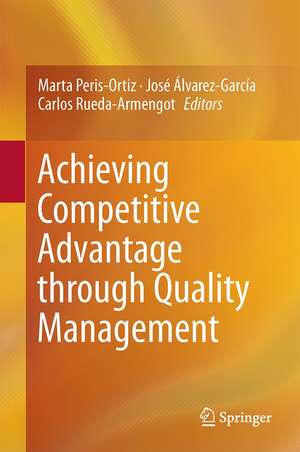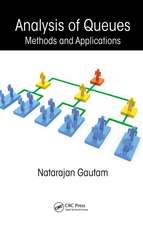Achieving Competitive Advantage through Quality Management
Editat de Marta Peris-Ortiz, José Álvarez-García, Carlos Rueda-Armengoten Limba Engleză Hardback – 9 iul 2015
In the current economic environment, characterized by economic turmoil and fierce competition, quality management has become a key strategy for organizations to overcome today’s challenges. Organizations benefits from implementing quality management systems by following two approaches. First, they implement quality practices aimed at ensuring customer satisfaction by considering consumer expectations and establishing strategies accordingly. Second, organizations improve processes by establishing efficient and effective process management systems that improve productivity, lower costs, reduce unnecessary expenses, eliminate all non-value added activities, and ultimately maximize excellence and customer satisfaction. Quality management thereby provides tools, techniques, and methods for continuous process improvement in both the professional and academic worlds, which, when implemented by organizations in times of crisis, enable more effective administration of activities undertaken by managers.
Containing contributions from various academics and scholars, this new book provides cutting edge research, methods and techniques providing a reference manual for academics, scholars, practitioners and policy-makers.
| Toate formatele și edițiile | Preț | Express |
|---|---|---|
| Paperback (1) | 641.85 lei 6-8 săpt. | |
| Springer International Publishing – 15 oct 2016 | 641.85 lei 6-8 săpt. | |
| Hardback (1) | 648.05 lei 6-8 săpt. | |
| Springer International Publishing – 9 iul 2015 | 648.05 lei 6-8 săpt. |
Preț: 648.05 lei
Preț vechi: 762.42 lei
-15% Nou
Puncte Express: 972
Preț estimativ în valută:
124.04€ • 134.78$ • 104.26£
124.04€ • 134.78$ • 104.26£
Carte tipărită la comandă
Livrare economică 21 aprilie-05 mai
Preluare comenzi: 021 569.72.76
Specificații
ISBN-13: 9783319172507
ISBN-10: 3319172506
Pagini: 180
Ilustrații: XI, 312 p. 45 illus., 30 illus. in color.
Dimensiuni: 155 x 235 x 22 mm
Greutate: 0.63 kg
Ediția:2015
Editura: Springer International Publishing
Colecția Springer
Locul publicării:Cham, Switzerland
ISBN-10: 3319172506
Pagini: 180
Ilustrații: XI, 312 p. 45 illus., 30 illus. in color.
Dimensiuni: 155 x 235 x 22 mm
Greutate: 0.63 kg
Ediția:2015
Editura: Springer International Publishing
Colecția Springer
Locul publicării:Cham, Switzerland
Public țintă
ResearchCuprins
Chapter 1 Benefits of Implementing a System of Quality Management in Spanish Thalassotherapy Centres.- Chapter 2 Quality Certifications as a Hotel Selection Criterion.- Chapter 3 "Q for Tourist Quality" in the Spanish Tourist Sector.- Chapter 4 The ISO 9001 Standard in the Spanish Construction Industry.- Chapter 5 The EFQM Model as an Instrument to Legitimize Organizations.- Chapter 6 Integrated Management Systems.- Chapter 7 Integration of Information in Higher Education Institutions for Quality Evaluation.- Chapter 8 How Communication and Control Processes Improve Quality.- Chapter 9 An Application of the SERVPERF Model in a Sports Centre.- Chapter 10 Experience in Adapting E-S-Qual to Different Sectors or Settings.- Chapter 11 Excellence in Tourism Destinations.- Chapter 12 Tensions Raised by TQM Demand Upon Work Design in Technologically-Controlled Environments.- Chapter 13 The Influence of an Institutional Environment on Quality Management in Hotels.- Chapter 14 A New Paradigm in Planning and Management of Quality Hotel Services.
Textul de pe ultima copertă
This book examines the ways in which quality management methods, tools, and practices help improve an organization’s performance and achieve sustainable competitive advantages. This volume includes quality techniques and tools such as the EFQM Model, SERVPERF model, E-S-Qual scale and the ISO 9001 certification and provide a wide variety of empirical studies in different economic sectors.
In the current economic environment, characterized by economic turmoil and fierce competition, quality management has become a key strategy for organizations to overcome today’s challenges. Organizations benefits from implementing quality management systems by following two approaches. First, they implement quality practices aimed at ensuring customer satisfaction by considering consumer expectations and establishing strategies accordingly. Second, organizations improve processes by establishing efficient and effective process management systems that improve productivity, lower costs, reduce unnecessary expenses, eliminate all non-value added activities, and ultimately maximize excellence and customer satisfaction. Quality management thereby provides tools, techniques, and methods for continuous process improvement in both the professional and academic worlds, which, when implemented by organizations in times of crisis, enable more effective administration of activities undertaken by managers.
Containing contributions from various academics and scholars, this new book provides cutting edge research, methods and techniques providing a reference manual for academics, scholars, practitioners and policy-makers.
In the current economic environment, characterized by economic turmoil and fierce competition, quality management has become a key strategy for organizations to overcome today’s challenges. Organizations benefits from implementing quality management systems by following two approaches. First, they implement quality practices aimed at ensuring customer satisfaction by considering consumer expectations and establishing strategies accordingly. Second, organizations improve processes by establishing efficient and effective process management systems that improve productivity, lower costs, reduce unnecessary expenses, eliminate all non-value added activities, and ultimately maximize excellence and customer satisfaction. Quality management thereby provides tools, techniques, and methods for continuous process improvement in both the professional and academic worlds, which, when implemented by organizations in times of crisis, enable more effective administration of activities undertaken by managers.
Containing contributions from various academics and scholars, this new book provides cutting edge research, methods and techniques providing a reference manual for academics, scholars, practitioners and policy-makers.
Caracteristici
Examines the ways in which quality management tools, methods and practices help organizations improve performance and increase competitiveness Includes empirical studies that use various quality management techniques and methods in different sectors such as Higher Education and Tourism Includes quality management techniques and tools such as the EFQM Model, SERVPERF model, E-S-Qual scale and the ISO 9001 certification











